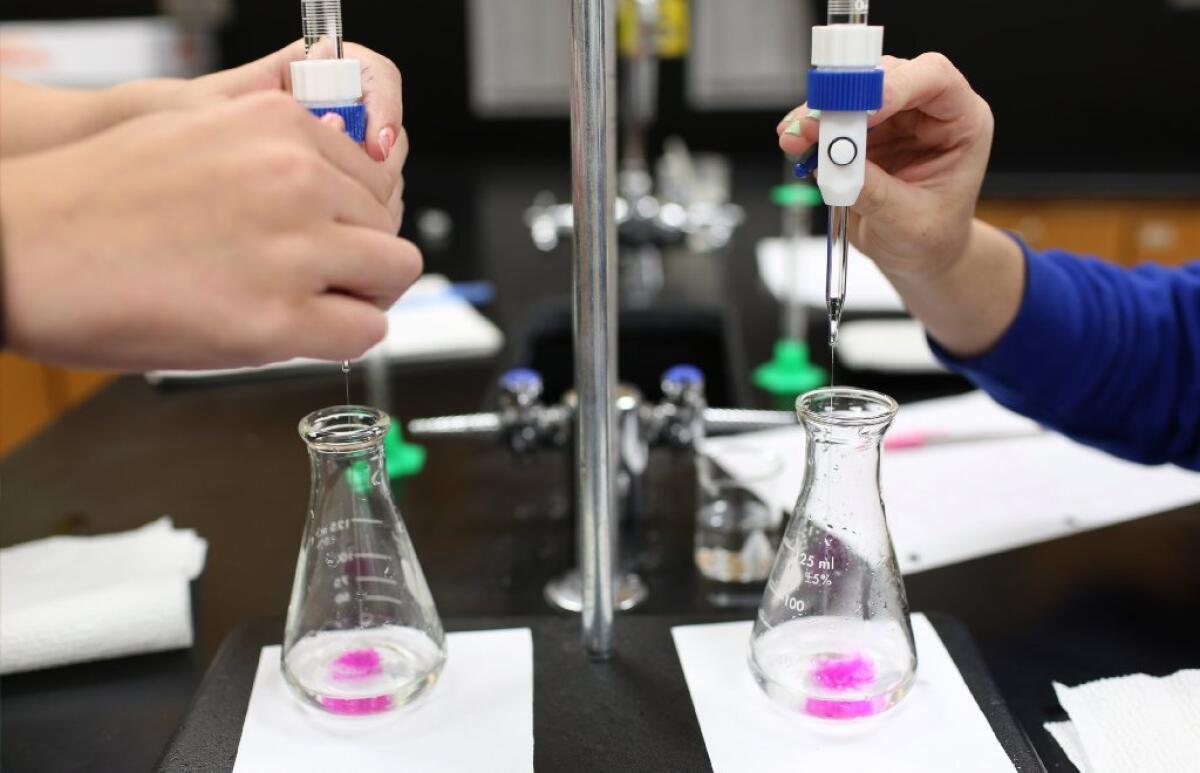American adults get a D in science; 22% confuse astronomy and astrology

A report by the Pew Research Center finds that Americans’ scientific knowledge is a little bit lacking.
Americans get a D in science.
So says the Pew Research Center, which issued a report Thursday on the state of the nation’s knowledge regarding some basic scientific facts.
The public opinion and research organization quizzed a representative sample of U.S. adults on geology, physics and astronomy, among other topics. Out of 12 questions, the test-takers answered 7.9 correctly, on average. That’s a score of 66%.
Only 6% of the 3,278 test-takers answered all 12 questions correctly. Twenty-six percent missed only one or two questions, and an additional 27% missed three or four.
At the other end of the spectrum, only 1% of those surveyed missed 11 of the questions, 2% missed 10 and 3% missed nine. (Want to see how you’d fare? Take the quiz here.)
See the most-read stories this hour >>
The more time people had spent in school, the better they did on the quiz. For instance, those who had earned some type of graduate degree scored an average of 9.5, while those who didn’t make it past high school averaged only 6.8 correct answers.
Men outscored women, 8.6 to 7.3, on average. Even when the report authors accounted for the fact that the men who took the survey had more years of education than the women, the gender gap remained, according to the report.
The Pew researchers also found that whites did better on the test than Latinos or African Americans. Their average scores were 8.4, 7.1 and 5.9, respectively.
The quiz was hardly a comprehensive assessment of Americans’ scientific knowledge, but it did include a mix of questions about things we should have learned in school and topics that have been in the news.
The easiest question for test-takers was one that asked which of the Earth’s three layers -- the crust, the mantle or the core -- was hottest. Fully 86% of people gave the correct answer (the core).
They did nearly as well on a question that was practically ripped from the headlines: “Which of these elements is needed to make nuclear energy and nuclear weapons?” Offered four possible answers, 82% correctly chose uranium. (The other options were sodium chloride, nitrogen and carbon dioxide.)
Comet ISON’s high-profile jaunt through the inner solar system in 2013 may have helped 78% recognize a picture of “an object in space that has an icy core with a tail of gas and dust that extends millions of miles.” (Sixteen percent of test-takers thought they were looking at a picture of an asteroid, and 6% guessed it was a star.)
See the most-read stories this hour >>
At the other end of the spectrum, the question that stumped the most test-takers asked how altitude affects the temperature at which water boils. Only 34% knew that the temperature is lower in Denver than in Los Angeles, compared with 26% who guessed the opposite and 39% who thought the boiling temperature would be the same in both cities.
Some questions were easier for younger test-takers. For instance, 80% of those ages 18 to 29 knew that radio waves make cellphone conversations possible. Only 57% of senior citizens were similarly informed.
However, the 65-plus set had an easier time identifying Jonas Salk as the developer of the polio vaccine -- 86% of them knew the answer, compared with 68% of adults under the age of 30.
More than one in five (22%) of those taking the test said astronomy was “the study of how the positions of stars and planets can influence human behavior.” The answer they should have given was astrology.
As the public grapples with issues such climate change, the rise of drug-resistant superbugs and genetically modified crops, a firm understanding of “scientific facts and principles” will help voters understand what’s at stake and “make informed judgments,” the report authors wrote.
The poll was conducted last year between Aug. 11 and Sept. 3.
Follow me on Twitter @LATkarenkaplan and “like” Los Angeles Times Science & Health on Facebook
Hoy: Léa esta historia en español
ALSO:
Drought is no reason to ease environmental protections, California voters say
Lower L.A. gas prices coming soon? Exxon Mobil is poised to increase output at Torrance refinery
Chinese visits to U.S. are expected to grow despite China’s economic woes







